Over the years, the United States has produced many remarkable generals and admirals, but only a few have stood out as world-class strategists and leaders of troops. As Veterans Day approaches on November 11, let’s remember and celebrate them. Here is my list of America’s finest 11 commanders.
Matthew B. Ridgway, 1895-1993 (WWII and Korea)
Few generals have done more to completely reverse a catastrophic strategic situation — proverbially pulling victory from the jaws of defeat — in so little time, as did the infectiously driven Ridgway during the Korean War. West Point Class of 1917, this was a man who parachuted with the 82nd Airborne into Europe during World War II at age 49. His standard accoutrements of a grenade hanging on one breast pocket and a first aid kit on the other projected the image of a bona fide field general, which he was, endearing him to the men.
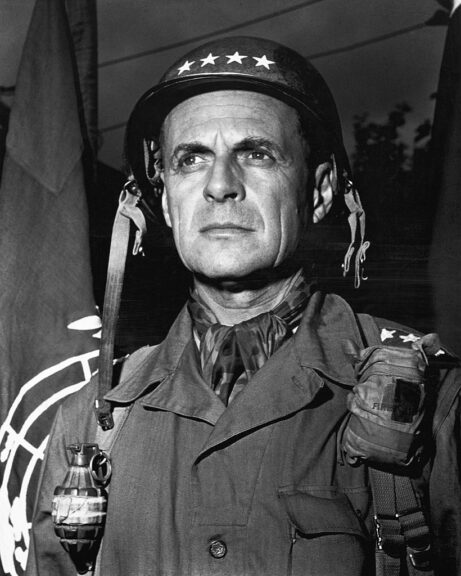
(Original Caption) Portrait of General Matthew B. Ridgway, Chief of Staff, United States Army. Getty Images.
Such a tough, no-nonsense commander was needed in Korea in the winter of 1950-51, when Ridgway’s superior, Douglas MacArthur, found himself in headlong retreat following the massive Chinese counterattack which negated his stunning victory at Inchon in the fall and subsequent advance through North Korea to the Yalu River on China’s border. The heady days of MacArthur’s optimistically named “Home By Christmas” offensive were long gone. By January 1951, the South Korean capital Seoul was back in communist hands, and the seemingly invincible Chinese People’s Liberation Army looked ready to push the withdrawing UN forces off the peninsula entirely.
The U.S. was fortunate to have Ridgway, who had never served in Asia before he got the call to fly to Korea and take over the Eighth Army after a jeep accident killed its previous commander, Gen. Walton Walker. In fact, as he took stock of the seemingly desperate situation on the peninsula, he soon realized he’d seen this scenario before, and Ridgway was well-suited to halt Mao’s winter offensive.
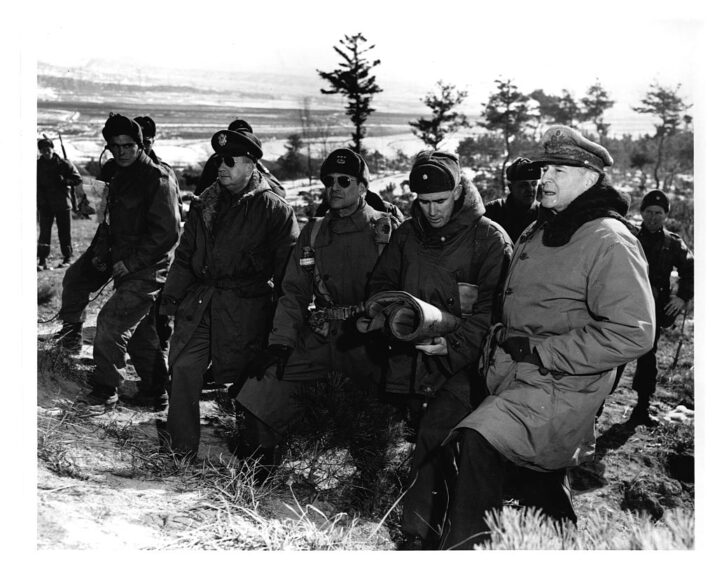
(Original Caption) : (Douglas MacArthur at the front lines above Suwon, Korea, accompanied by Courtney J. Whitney, Matthew B. Ridgway, William B. Kean, and others.) Photoprint by USASC 28 Jan. 1951(no. SC 356736) lot 8755 (Photo by Library of Congress/Corbis/VCG via Getty Images)
During the Second World War, Ridgway had been instrumental in blunting the German winter attack of 1944-45 through the Ardennes, popularly called The Battle Of The Bulge. He restored order and discipline to his panicked troops, a circumstance eerily similar to the UN “bug-out” before him. While some saw the Red Chinese as supermen, Ridgway had no such fearful delusions. In fact, he understood that by the time the communists had retaken Seoul, they were over-extended and suffering from exposure to the elements as well as malnourishment due to severely taxed logistics. This was not unlike the position Von Rundstedt’s Panzer groups found themselves in by January 1945. While some generals and civilian authorities alike were declaring Korea lost and planning for evacuation, Ridgway saw an opportunity to destroy Mao’s exhausted, starving, frost-bitten legions.
Stern, ramrod straight, in excellent physical health, one gets the feeling that were we to look up “U.S. General” in the dictionary, Ridgway’s resolute face would glare back at us. And his determination to win prompted him to get the word out that the plague of defeatism was over. The U.S. would go on the offensive and end this “bug out” nonsense. In fact, he forbade even the use of that defeatist term. Ridgway officially took command of the Eighth Army on December 26, 1950, and by January 15 the U.S. and Republic of Korea (R.O.K.) divisions were holding firm. There would be no evacuation of the peninsula.
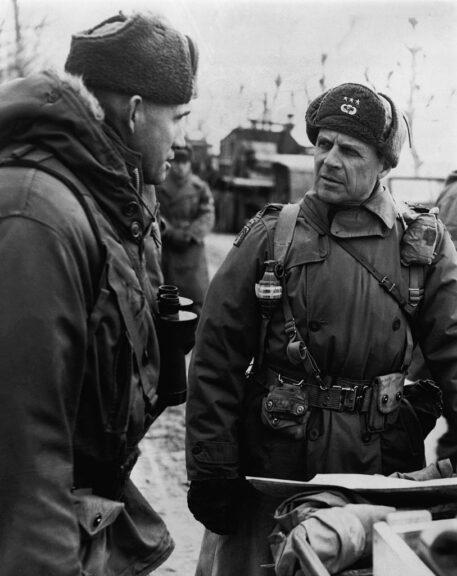
(Original Caption) Commander Of The 8th Army Goes To The Front, Korean Battle Continues. Lieutenant General Matthew B. Ridgeway, commanding General 8th Army talks with James H. Lee, Dallas, Texas, during the former’s inspection of the front line positions in Korea. The General is on the right. (Photo by © Hulton-Deutsch Collection/CORBIS/Corbis via Getty Images)
In preparation for his counteroffensive, Ridgway led by example; his first order of business was to move the Eighth Army Headquarters from 115 miles south right up to the front lines. Then he constantly roamed and overflew the lines, getting a feel for the men’s needs and concerns. Having stabilized the front (a Ridgway hallmark) he then instilled in his men a sense of a righteous mission to save the world from communist enslavers.
Beyond ideological verve, Ridgway made sure that his troops had the full support of their commanders who would provide them with good winter clothes, plenty of food and ammo, reliable weaponry, and a sense that, as badly worn as they were, the Chinese were much worse off. Indeed, with severe winter laying waste to the poorly equipped, drained enemy, he viewed the bitter cold as an ally. A point he made sure was driven home to the men as well.
With this renewed confidence, Ridgway’s command opened up its February 1951 counteroffensive; he set about using his overwhelming advantage in artillery and air power to systematically destroy the malnourished and exhausted Chinese. As a clue to his mindset as a no-nonsense warrior, Ridgway dubbed his offensive operations pugnacious names like “Killer,” “Ripper,” and “Rugged.” This was typical Ridgway bravado, designed to inculcate in his men a ruthlessness that gushed down from their commanding general to the lowliest private.
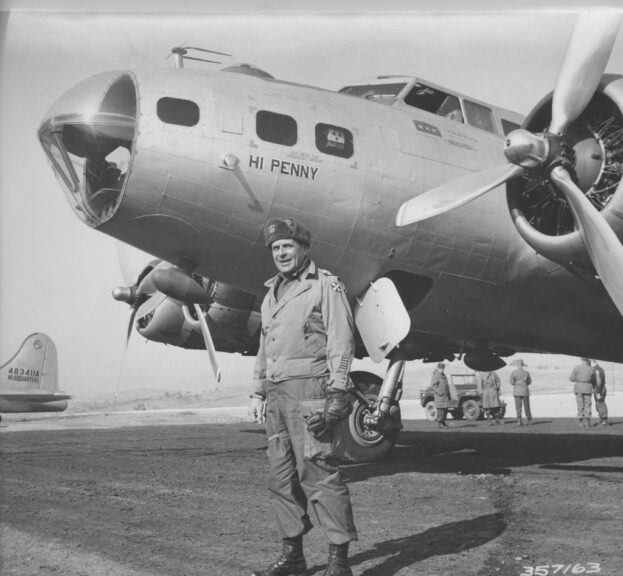
Lieutenant General Matthew B. Ridgway (1895-1993), CG of the United States Eighth Army, standing in front of his USAF B-17 plane ‘Hi Penny’ during the Korean War, Korea, 30 January 1951. (Photo by FPG/Getty Images)
Soon the U.S. and R.O.K. columns were advancing northwards again, retaking Seoul in March 1951. So successful was Ridgway’s 100-day turn-around of UN fortunes, that President Truman felt he had political clout to fire the outspokenly recalcitrant MacArthur and put Ridgway in overall theater command. It is no exaggeration to say that Ridgway saved the war, and with it Truman’s presidency and the United States’ credibility.
As with certain iconoclastic figures, Ridgway could rub his peers in the military and those in the political arena the wrong way with his strong views on how wars and policy should be conducted. Yet, unlike MacArthur – whom he publicly praised while privately vowing not to repeat his mistake racing to the Yalu – he understood and respected his subordinate role. He was a firm believer in military subservience to civilian control. Married three times, the maverick general who lived to 98, managed throughout his career to speak his mind, unconcerned for his career path. In particular, he clashed with Eisenhower over mission creep in Southeast Asia and U.S. hegemony. In turn, Eisenhower despised Ridgway so much that in his memoirs he never even mentions him, falsely showering credit for retaking Seoul onto Ridgway’s Eighth Army command successor Gen. Van Fleet.
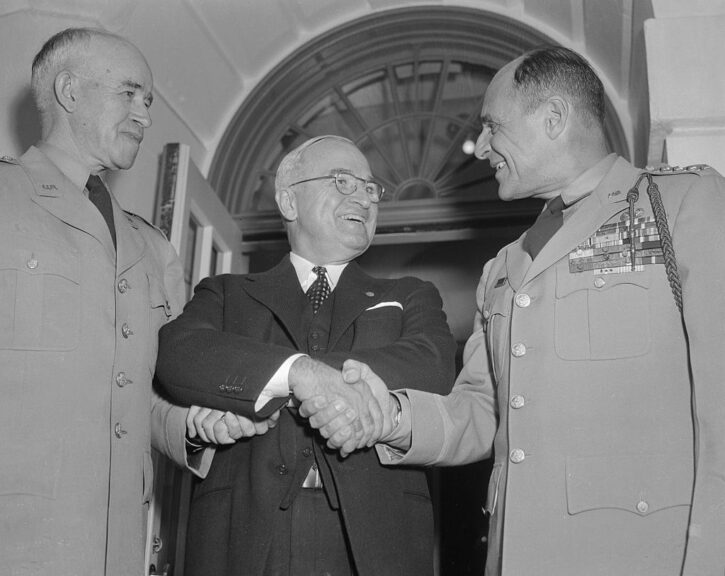
(Original Caption) General Matthew B. Ridgway (right) is greeted by President Truman as he arrives, May 19, at the White House with General Omar Bradley (left), Chairman of the Joint Chiefs of Staff. Ridgway is enroute to Europe where he will replace Gen. Dwight Eisenhower as NATO commander. While in Washington, Ridgway will be called before the Senate Armed Services Committee, May 21, to be questioned on the Koje Island prison capture of an American General.
Ridgway’s vision for a modern military went beyond strategy. He was a champion of integration of all armed forces, while opposing women in combat. Seen by the Left as too merciless and the Right as too isolationist, nevertheless, it was Matthew Ridgway, along with Truman and MacArthur, who was most responsible for saving South Korea, and with it, the millions of citizens who were spared the hellish existence of living under their northern antagonists — enemies whom this underappreciated American general knew how to fight so well.
* * *
America’s Top 11 Generals
* * *
Brad Schaeffer is a commodities trader, columnist, and author of two acclaimed novels. His newest book, the fact-based LIFE IN THE PITS: My Time as a Trader on the Rough-and-Tumble Exchange Floors will be published in December and is currently available for pre-order. You can also find more of Brad’s articles on Substack.
The views expressed in this piece are those of the author and do not necessarily represent those of The Daily Wire.

Continue reading this exclusive article and join the conversation, plus watch free videos on DW+
Already a member?

.png)
.png)

